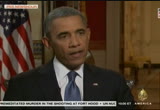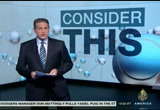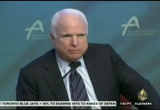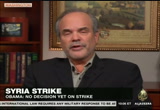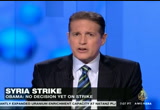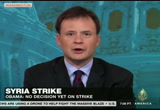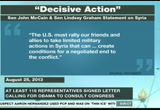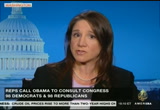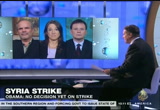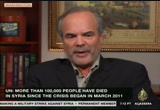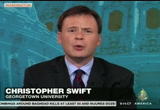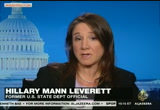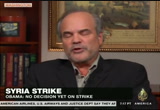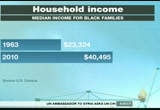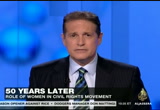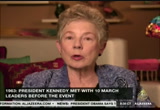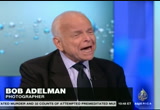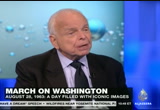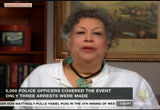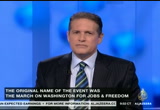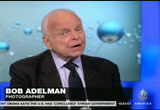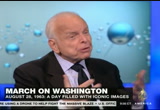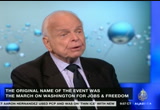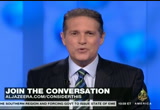tv Consider This Al Jazeera August 28, 2013 10:00pm-11:01pm EDT
10:00 pm
>> welcome to aljazeera. i'm john siegenthaler. here are tonight's top stairs pop president obama said this evening he's concluded that the government in syria carried out chemical attacks against its own people and the president said a limited tailored military strike would send a shot across the bow of the assad regime. >> i have not made a decision. i have got options from our military, had extensive discussions with my national security team. if the assad regime used chemical weapons on his own people, that that would change some of our calculations, and the reason has to do with not only international norms, but also america's core self interests. >> the army major convicted of
10:01 pm
killing 13 people at fort hood in texas has been sentenced to die. nadal hassan was sentenced earlier today. that sentence will be automatically appealed. >> on the 50th anniversary of martin luther king's "i have a dream" speech, thousands gathered in washington, d.c. again. former presidents, celebrities and every day americans were there. >> near two weeks, firefighters are till fighting that fire out in california. we'll have the latest news coming up at 11:00 here on aljazeera. ♪ theme ♪ theme >> as the u.s. may be drawing closinger to intervention in
10:02 pm
syria polls vin to show a large majority of americans oppose military action. how can the u.s. build an international coalition when its leaders can't build one here at home? also, twitter, google and "the new york times" websites suffer cyber attacks. a group connected to the syrian government is the likely culprit. how vulnerable is america's cyber infra structure to another attack. >> the women who worked side by side with the men during the civil movement the were given their proper due. >> we begin with syria, and how an attack that seemed eminent may be less so now. president obama it is he hasn't yet decided to take action. while britain, france and turkey are open to military intervention, the u.n. and arab league are far from a consensus. as we report, average americans and american politicians are just as divided.
10:03 pm
>> president obama says he's weighing his options on syria. >> i have gotten options from our military, had extensive discussions with my national security team. >> but building a coalition of the willing is proving very challenging. >> the use of force without sanction from the u.n. security council is a crude violation of international law. >> political solution is the most important approach. >> it's not only internationally where the u.s. finds little consensus on how to respond, it's also at home. >> i don't think we have the authority either under our constitution or under international law to get involved in a civil war in syria. >> we don't need u.n. corroboration, but it would be nice to have it. >> four u.s. destroyers are on patrol in the mediterranean.
10:04 pm
the congressman wants the white house to get approval from congress before launching any strikes. >> this i guess not right. it's not a democratic issue or republican issue. >> the military intervention in syria would face resistance from the american public. polls suggest americans are wary after 12 years of war in iraq and afghanistan. >> a new survey by reuters news agency found 9% of americans think the u.s. should intervene in syria's civil war. that figure rose to only 25% if reports that syria's government used deadly chemicals to attack civilians are confirmed. the result suggests that if the obama administration takes military action against the syrian regime, it would do so in the face of strongly divided opinions abroad and at home. aljazeera, new york. >> right now, russia and china
10:05 pm
seem prepared to block support for intervention in the u.n. security council and the british vote that action be delayed until u.n. inspectors release their report. can president obama build support overseales and at home to take the sort of military strike he has threatened. with us is michael hirsch, hillaryman leveritt and christopher swift. thank you all for joining us tonight. hillary, president obama said wednesday he has not decided whether to launch a strike that would punish the assad regime for last wednesday's gas attack on civilians in the suburbs of damascus, saying any attack would be focused and deceasive but in a clear way. can any military action be clear
10:06 pm
and decisive and limited at the same time? >> well, the discussion here in washington seems to be just a question of which day the attack is going to take place, so i haven't seen any real discussion, any real substantive discussion rolling back any plan to attack syria. the idea whether it can be clear, limited and decisive is something that we have not seen really in history. we saw during the clinton administration, pin trick strikes against iraq that didn't do anything and saw them take out a pharmaceutical plant in sudan that just debriefed citizens of medicine. >> michael, do you think with the british sort of backing away that president obama is clearly moving forward? >> yeah, i mean, i don't think he has any choice. it's really just a question of when he drew this red line a year ago, the rhetoric coming from senior officials, including the vice president and secretary of state john kerry in recent days has been unmistakable that
10:07 pm
we are sure that these chemical weapons were used and consequences must result from that, so if he does not act at this point, he would truly lose all credibility. i think that's one of the reasons why the discussion in washington is more about when and how rather than if. >> on the other hand, there's a lot of division in washington and president obama struggling to build a coalition to support a serious strike her domestically. wednesday, speaker boehner said he wants the president to explain himself, he said in a letter to the president saying he wants to have the president explain himself to congress, to the american people before taking any action. we have 116 representatives at least now, 98 republicans and 18 democrats who have signed a letter that was sponsored by virginia congressman that calls for the president to consult with congress before launching a strike, and that reads in part "engaging our military in syria when no direct threat to the
10:08 pm
united states exists and without prior congressional authorization would vital the accept operation of powers clearly delynn 80ed in the constitution." the question is should president obama listen to these congressman, consult with congress and get prior approval before military action. >> he's not required to under the u.s. constitution and not even under the war powers resolution. the president has the authority to commit forces in the field for a limited period of time, 30 to 60 days, has to provide congressional notification after the fact, but assuming congress doesn't cut off the fundedding, can sustain those forces indefinitely, notwithstanding the notification. from a policy standpoint, it's absolutely vital that the president consult with congress. when congress and the executive are on the same side on something, that's usually a sign that the american people have understood the consequences and the costs and potential benefits of a military intervention. when you have as much
10:09 pm
fragmentation both between the parties and also within them on an issue, that's a speed bump, an indication that there are issues that need to be thought through, and that's part of the reason why we, like the british, should take some time before moving forward. >> that's an important point. it's not between the parties, it's within the parties. >> that's right. >> the division is everywhere. while it may be legal to do the pin prick strikes to use hillary's words, let's talk about these mixed signals coming from congress. on the republican side, john mccain, lindsey graham released a statement pushing for wider military action in syria than what president obama wants. carding to the senators, the senators said: >> also in the republican party, a rising leader, senator rand paul seems a lot less interested in a military strike, saying:
10:10 pm
>> among republicans, hillary, do we have a big division there between some of the more old line republicans, although some of the old line republicans are also divided, because newt gingrich does not agree with mccain and graham and then we've got the younger libertarians. what's happening there. >> i'm not it is a generational divide, it is a real determination by senator and powell in particular to take back the republican party from the neoconservatives. rand paul like his father have been determined for years to take the republican back to its conservative foreign policy roots that they think were highjacked by you the neoconservatives after 9/11. newt gingrich had been very supportive of neoconservative foreign policy principles and policies but recently said that
10:11 pm
the iraq war and other failures in foreign policy behoove the republicans to ask hard questions like those posed by senator paul. you see this in the lead up to the presidential race in 2016, a real determination by some in the republican party to try to take the party back. >> you mentioned vice president biden seems solidly behind a strike on syria. let's listen to what he said on tuesday. >> the president believes and i believe that those who use chemical weapons against defenseless men, women and children should and must be held accountable. >> consulting congress does not seem to be on the top of his agenda now. back when he was running for vice president in 2007, he had something very different to say when president bush was talking about possibly attacking iran because of its nuclear weapons program. >> if he takes us to war in iran
10:12 pm
without congressional approval, i will make it my business to impeach him. [ cheers and applause ] >> that's a fact. >> michael, some hypocrisy there. >> there's a big difference between being in the legislative and executive branches, and that's what you're seeing, apologies the fact that a different party was in power. it's also, let's keep in mind, a different kind of war. picking up on what hillary was saying, it's important to point out that obama has shown extreme reluctance, more along the lines of rand paul certainly than mccain to intervene in any way in the occurian civil war because of the shadow of iraq, because of at as made over the last decade or so. they've made clear despite the very tough rhetoric that whatever they do is going to be limited, it's probably going to be a matter of days by the time people decide, that is the
10:13 pm
american people thinking about it, it will probably be over. that's probably what obama in tends. we think it probably will be some form of cruise missile strikes and other air strikes lasting two or three days. the president does not want to tilt the balance in the civil war because of assad and those who might replace him, potential islamist groups linked with al-qaeda. >> they might make matters worse. is secretary guilty of hypocrisy, as president bush was moving to war with iraq, he wrote: >> president bush did that, but now that he's secretary of state, the tune has changed. he was very powerful saying this week that he didn't leave much room for consulting with
10:14 pm
congress. he was very clear about what he thought, chris. again, hypocrisy or no. >> i wouldn't blame that on secretary of state kerry as much as on james madison and the whole notion that ambition within each of the different branchion of government is going to sort of keep things in check. that's our constitutional system. there is no executive branch authority that's going to say that congress should have as much power as congress thinks it should have and no self respecting member of the house or senate is going to think that the executive should overstep it's authority especially with questions of war. rather than looking at this constitutional question i'd like to focus on the strategic question, which is to say what happens after we intervene in syria, what's our plan for the next day, the next week, the next month, the next year. part of the reason you see so much fragmentation within the political elite in washington and skepticism among the american public is this doesn't
10:15 pm
show us the strategy and our tendency has been in the last decade to confuse operations with strategy and ultimately strategy with policy. >> i want to stay a little further on these divisions, because it's a division within the administration itself, not just the fact that some democratic congressman are calling or consultations and for him to hold back. joints chiefs of star dempsey has made it clear he is opposed to american involvement in syria's civil war. pretty direct conflict between dempsey, kerry, the vice president and now the president. >> you see it in europe and the united states, as well, the british defense forces, the british military, the french military, the german military are all against this. military in capitals that are our allies are against this, including our own, because it doesn't comport with reality on the ground. people aren't asking the basic question to see the real evidence of what's gone on on
10:16 pm
the ground. there's an assumption that it had to be the assad government without waiting for the u.n. inspectors to come back. this is exactly what happened in 2003. you have the military not wanting to get basically hood winked yet again to invade yet another muslim country and cause american real damage in terms of lives answered treasure. >> i've got to address the american public not sold on a syria attack because of what you said, the latest poll had only six out of 10 americans that do not want the u.s. to intervene. 9% said they'd ok it. the number goes up to 25% when you bring in the chemical weapons attack. that is different two years ago, when a strong plurality supported unilateral u.s. action in libya. do you think it's just this war fatigue that has gotten us here that we just can't support any kind of action in the middle east right now?
10:17 pm
>> it's very much so. i also have to say i really disagree with what was just said. i don't think there's a divide between the civilians and the administration and military at all. i think dempsey was laying out obama's position in terms of not intervening in the civil war per se as opposed to punitive strikes which he says now. >> michael, he expressed opposition to air strikes and was talking about how much money it would cost and he seemed clearly oh poled to -- >> but that was before the administration ginned up over this issue of intelligence showing that the assad regime had used chemical weapons. i don't think you'll hear the general saying i oppose punitive air strikes now. this has been a dramatic shift over the last several days in terms of rhetoric they're using based on what they say is very, very solid intelligence and they are trying to contrast this with the trumped up case against
10:18 pm
iraq. this is not starting a war with a country like iraq or iran. it is strikes against the regime. i agree they have not made clear the mission. let's not confuse the issue here. this is not about some huge divide within the u.s. government. it's just not there. >> we'll see what happens and what support there is for whatever action the united states takes. really appreciate you guys being with us tonight. >> coming up above ground to a hacker war on the internet. how safe is our crucial infrastructure. >> we'll look at the role women played in the civil rights movement. we are fielding your questions. please join the conversation on twitter@ajconsiderthis.
10:20 pm
>> al-jazeera america, a new voice in american journalism. >> introduces "america tonight". gas. >> a fresh take on the stories that connect to you. states. >> grounded. >> real. >> unconventional. >> we spent time with the gangster disciples. >> escape from the unexpected. >> i am a cancer survivor, not last week al jazeera america launched a new and needed voice in journalism. the new york times calls it "serious, straight-forward news". "accurate, responsible" says the washington post. and the baltimore sun says, "instantly engaging and powerful".
10:21 pm
al jazeera america, there's more to it. >> as the cries in syria plays out, rogue hackers have been busy with cyber attacks on the u.s. if you tried to go to "the new york times" website tuesday to get the latest on syria, you would have been directed to the syrian electric army instead manufacture it has been restored, but twitter accounts and even president obama's social media has been sit since the war in syria began. while it has been a nuisance, the threat of a major cyber attack on critical american infrastructure is a growing concern and clearly on the mind of janet napolitano. >> our country will for example at some point face a major sign are event that will have a serious event on our lives, the economy and the every day funking of our society. more must be done quickly.
10:22 pm
>> joining me now to talk about the implication of cyber attacks and the threats we might face is a former hacker. he is now a director investigating threats and vulnerabilities. thanks for joining us. the basic question, let's start with the syrian electronic army. who are these guys and are they just a nuisance? so far, they've been attacking these social media sites, but have caused harm. in one case a few months ago, they put out a tweet that talked about explosion at the white house and it caused the stock market to plunge 150 points. even in their nuisance way, they've caused harm already. >> yeah, what we do know so far about them is that apparently, they are young people, a hacker group based of young people in syria, but probably there are more people in other middle east
10:23 pm
countries that are helping them. they have been active pretty much for the last few years, so they have started doing these hacks in 2011, and they started attacking israel websites, so then they migrated once the syria conflict started, they migrate to attacking western media companies, including the new york time yesterday and also washington post and as you said, a lot of social media and other important media in the western world -- >> it's getting worse. the problem is that they are not even that sophisticated, i mean, in fact, we saw how -- we know that some of them are what we call -- they do not launch complex attacks, but those
10:24 pm
attacks are out there launching and working. that's my big concern now. >> we've heard for years that cyber attacks could take out power grids, financial markets, banks and officials have done drills and simulated attacks. we're going to show you one called cyber shock wave, produced by the bipartisan policy center, including a whole fake newscast with real officials. >> the country's internet system is now slowing down to a virtual crawl. communications with financial trading houses are almost at a stand still. >> it is an active war. you turn off everybody's cell phone, you don't allow them to bank, work, communicate be this is an attack on the united states. it may not be a bomb, but it's much more significant than a bomb going off. >> scary simulation there. what systems are in place. what's the danger of that kind of scenario. >> ok. i know we have been spending
10:25 pm
billions of dollars protecting this kind of infrastructures, so i'm not very worried about critical infrastructures being attacked. they are being attacked every single day, but i think they are well protected. in fact, if we talk about things like the nuclear plants, we have systems in place, what we call air gaps. it means that those systems are not connected to the internet. we have big separation between internal networks and the internet. even if you want to attack those kind of critical infrastructures, you have to have physical access to those installations. i think it's not that big problem right now. i would say that the big problem right now, it's cyber espionage, that the companies with private information or intellectual property. that's my big concern now. >> obviously a big problem. why then do at some very high
10:26 pm
american officials said that they believe that poor internet security has now become a bigger threat to the united states than global terrorism. >> yeah, and i completely agree, but once again, i think that the physical damage is not going to happen, at least in the next few years, because we have spent a huge amount of money on protecting those infrastructures, and as i said, stealing information is much more easier than actually performing real damage. >> the head of national intelligence james clapper agrees with you, thinking it's only a remote chance of some sort of widespread attack that would cause some sort of regional outages, but you've got china employing thousands of engineers, a hole army targeting both cyber he is meanage and other ways, going after fortune 100 companies, russia and iran also in that business, china,
10:27 pm
the most active aggressors, china the one we really have to worry about? >> i think we have to worry about every single country out there, and every single not only countries and governments, but also individuals, and groups of hackers that are stealing information and selling that information to governments, because most of the times when we talk about cyber espionage, there is no government behind that, but it's like willful hackers stealing confidential data and information from western companies and then selling that information to governments. of course, and governments, such as china as you mentioned, and even russia and we have seen cases in iran and north korea, they have these capabilities inside their armies, but the problem right now are the groups selling the private information and confidential information. >> i hope you and james clapper
10:28 pm
10:30 pm
>> tonight's data difficult looks at however america has come since the march on washington in 1963. we looked at numbers provided by the u.s. senses, population, in 1963, the total estimated number of blacks in america was 20,200,000. 2012, that 14 doubled to 44.5 million. on to the economy. these numbers are adjusted for inflation. the medium in come for black families in 1963 was $23,300. in 2010, that jumped to $40,500. the poverty rate for blacks first measured in 1966 was at 41.8%. today, it's down to 27.6%.
10:31 pm
still a major problem. but education is much improved. in 1964, there were 234,000 black undergraduate students in america. the numbers shot up to 2.6 million, more than 10 times the amount. more good news, the rate of blacks aged 25 and over who completed four years of high school tripled from 25 perfects to more than 85%. >> in 1963, there were five black members of congress and no senators. in 2013, there are 43 black members of congress and one senator, a lot of room left for improvement in the upper chamber. >> you can look to the movies for encouragement. flipper was the number one film on august 281963. this year, it's lee daniels, the butler, which just happens to be about america's civil rights
10:32 pm
10:34 pm
that's the headlines "consider this" is up next on al jazeera. ♪ >> i have a dream that one day this nation will rise up, live out the true meaning of its creed. we hold these truths to be self evident that all men are created equal. >> as we commemorate the 50t 50th anniversary of martin luther king's inspirational speech, what he said was all men
10:35 pm
are created equal. he was echoing the declaration of independence but did he speak to the way women were viewed and valued? joining us to discuss this are two women who were at the march, lynn french, adjunct professor of history of civil rights, and executive director of hope and home, also from washington, d.c. annie grower, a contributor to the see the people blog on the washington post website and martha burke, the money editor of ms. magazine and producer and host of "equal time with martha burke." you look too young to have been there. lynn, i want to ask you what did being there on that important day 50 years ago mean to you as an african-american woman? >> on that day 50 years ago, it was just the most amazing experience i'd ever had in my 16 years. you have to look at it in
10:36 pm
retrospect, we sometimes see things that you didn't see then, and you have to remember that at the point the people converged on washington, we as a community were off of a very hard fought battle in birmingham, in albany george. >>, in mississippi, in alabama, people were struggling to have the right to citizenship, the right to vote, the right to public accommodations. people were being jailed and this was a culmination of those efforts to come to washington and petition the federal government to intervene and insure that in fact all citizens have equal treatment. >> annie, you were there, too, 50 years ago. again, you were there today for the march today. how did being there in 1963 impact who you became no. >> it changed my life. i was 17, and i had a summer job. i was on my way to college and i realized that there were people all over the country who i was
10:37 pm
aworking class examined kid of immigrant parents but still had this genetic advantage and needed to go down and say i'm standing with everyone else, because it was so important. i went into college thinking i would be a high school english teacher and i said no, i needed to go into journalism to stand up, bear witness and maybe make a difference. >> martha, you've written about the ways in which the women were at times overlooked. there was only one woman on the dais that day. why was it? >> well, certainly with the march, the woman who did not get her proper due was dr. dorothy hite, one of main planners of the march. she was the one woman and they used to crop her out of the pictures, until she learned to
10:38 pm
stand in the middle where they couldn't crop her out. she made her case as strongly as possible to have a female speaker on the podium that day, have a female speaker, and they refused. the men all said no, the men are going to do this, and after the march, president kennedy invited the organizers to come to the white house. if you looked at the pictures today on t.v. of all the men with kennedy, they told the women you can't come, go back to your hotels, and that included coretta scott king, king's wife. >> you feel she was marginalized in the years after the march? >> in the years after the march, after he was assassinated, the male movement leaders at that time came to her and they said we know you're planning on opening the martin luther king center in atlanta, which exists today as the most complete archive of the civil rights movement. we know you're going to open this, but you really need to step aside and they use those
10:39 pm
words, step aside and let us run it. of course she refused. she said no, i am coretta scott king, i am not going to step aside, but they certainly did pressure her to do that. >> lin, you are not on the aim page. >> there is no mention of her on the king memorial to this day, and martin luther king said hands, the statute do not show his wedding ring, which he very often wore. >> lin, you think that women weren't quite as marginalized as that? >> i guess my opinion is that at this point, we were struggling for rights for all african-americans, we called ourselves negroes then. the women's issue is an issue that gained 1964 civil rights act that came the next year after that included women and
10:40 pm
women became -- got legal recognition of the rights for equality. i'm not saying that women didn't have those rights before then, but i almost think that it's a mistake to view historical actions by future standards. i just don't agree that criticism of the civil rights movement, that because there were african-american men there that day, and no women speaking that women were just being ignored. >> and looking back, some authors have said that women were the backbone of that civil rights movement. annie, do you think that the issues that were being fought for at the time included enough of the ires that faced women or at that point was the civil rights issue the one that completely dominated the civil -- the issue of segregation and jobs and everything else that
10:41 pm
african-americans were suffering back then? >> i think all of those issues impacted women as well as men, but i have to agree with lin that if you look back in those days, and the same thing happened several years later in the anti war movement, it was a very heavily male movement. i think women only got their voice as a woman's movement developed, but at the civil rights march, i believe that it really was that sort of the push forward for all african-americans, and no question that it was totally ignoring women out there was totally appalling, but i think that that we really are in some ways overlaying what we think of today back then. >> lynn, do you ever feel a pull between or a need to prioritize between the importance of being a woman versus the importance of being an african-american?
10:42 pm
>> i'm an african-american woman and each is an important issue to me. at that time in 1963, the barriers that were presented before me were because i was an african-american in a segregated city. i also know that part of my history as an african-american is that women within my culture were not cavity aside. if it weren't for rosa parks or ella baker, or countless other women, there wouldn't have been a movement, and i don't believe that any of them were looked down upon. it's just that dr. king was dr. king. he was the person who grabbed the microphone and was. he's the one who galvanized the larger movement. i really think that it's a mistake, perhaps in other communities, where the men have not been oppressed, maybe it's
10:43 pm
seen as more important to say that in 1963, women should have been there than it would be for someone from a community where you just couldn't go to the same schools, you couldn't ride the same buses, you were getting thrown in jail, beaten, fire hoses, police dogs, the whole nine yards, not because you were a woman, but because you were what we would then say negro. >> we have questions coming in from viewers. i would like to get to hermela. >> our viewer says women are still getting paid less than men and also not getting higher positions. why hasn't anything changed? >> well, that is right, the pay gap has not changed in 10 years, and african-american women are certainly paid less than white women today as they were back in 1963. the pay gap is still very large between women and men overall.
10:44 pm
i want to go back to something that was said earlier, because what i am saying came straight from dr. door 3hite, from coretta scott king, it is not my personal opinion, it is what i was told personally by the people that were during, by dorothy hite who worked right alongside the men. she said when it came time to the recognition, they left me out, they left me out of the march recognition, they left women out in general. women did do a lot of work in the movement, but they did not get recognized for it, and she told me, she said that is what gave rise to the women's movement in the african-american community, the women were ignored. >> i wanted to go there. whatever the role of women and recognition was back in 1963, how, martha, did the work that was done in the civil rights movement impact then the women's movement that followed?
10:45 pm
>> well, it gave rise to it, essentially, because even in the white community, the anti war community, the civil rights movement overall, women were still treated like honey, go get the coffee, and they will tell you that, and they have said that all these years, yes, women were the backbone of the movement. i don't dispute that at all. all i'm saying is they did not get the credit they deserved. they don't get the credit today. if you go out in the street and ask people about women in the civil rights movement, they're going to name rosa parks and maybe fanny lou hamer, one or two others maybe, but they can yet name many men, because the men were front and center. i'm sorry that that's the way it was, but that is history. >> all right, well thank you for joining us, martha, and knee and lynn are going to be back after the break and we are going to
10:47 pm
10:48 pm
images paints a fuller picture. they are out there and deserve to be examined. joining us to share powerful images from the march on washington, please welcome the photographer behind a beautiful new collection called i ever a dream, a 50th year testament to the march that changed america. we are joined from washington by lynn french, university of virginia adjunct professor who teaches civil rights and annie grower, a washington post contributor. i want to ask you, you chose on your own to cover the civil rights movement, you were a freelance photographer and covered it before the march on washington. was that one of the most special days of your life. >> yes, of course, but i was a volunteer and trying to break into magazines at that time, but i had no assignment. i just came there as a volunteer, and because, well, the -- it's hard to remember
10:49 pm
this, but the movement at that time was a few hundred, maybe a few thousand people doing very specific and very often very dangerous things. the movement was confronting segregation, which sounds like the separation of the races, but it was really enforced by terror, and it was very dangerous work. i came there. we had a saying in the movement when the spirit says move, you move, so this was a great day, because we were protesting the fact, i mean, only weeks before, president kennedy had announced legislation, and he was the first president to ever say that segregation, which, you know, demeaned and was a violent system was wrong. no president in 100 years. >> i want to move on to see some of the picture, because they are beautiful and powerful images.
10:50 pm
>> thank you. >> i know you were floating around and able to get a lot of different pictures than what you often see. the first one, we see martin luther king as he's beginning his speech. he was looking down at his papers. he started reading from a preordained script and then we just saw a picture of mahalia jackson. what's the story behind her importance to that speech that day? >> well, the story is that as with any movement, speeches evolve as a leader oh are a speaker goes around from place to place speaking and dr. king had been talking about this dream for a while, and i guess people had advised him to make this speech entirely different and not talk about the dream, and he hadrian different speech and he was into that speech and mahalia jackson, his favorite singer, turned to him and said
10:51 pm
martin, tell them about the dream. and that's when he cut loose and started talking about it. >> i want to go back to those pictures if we can. you see the transition, you see exactly what happened. you see him serious looking at his paper there and then in just a moment after she called out to him and he started improvising and using that speech that he used before, you see him with almost a different level of energy and see him ending triumphantly. annie, what was going through your mind as you watched this unfold? >> remember, i was so far back, as this was unfolding, that a small gesture, leaning forward saying martin, remember the dream, was so lost on me, but whatever the spirit was that moved him, it was just really an electrifying moment. it was just excite extraordinary. >> bob, here's a picture you took of the congressional
10:52 pm
delegation that was there, significant leaders important to the civil rights movement and congress and it was very important they be there. >> yes, of course, the whole purpose of the march was to get congress to pass legislation, and these congressman were on our side, but we also knew when so many people showed up, to say we were only to small band of people comparatively, when hundreds of thousands of people showed up, we all knew something was in the air and something might happen now. >> lynn, did that give you hope that those congressman would lead to legislation as they did? >> sure, but i was more moved by seeing a quarter million people than a few congressman. as a 16-year-old. i would imagine, though, that many politicians, once they took
10:53 pm
assessments of how many people were there and how this whole event reverb rated throughout the country thought well maybe i need to give a positive vote only manner. >> let's look at another picture of another very important figure oh who was there. you photographed rosa parks that day. what was your impression of her? >> well, rosa parks was a great heroine. she appeared at every one of doc's events, and i photographed her at his funeral, and i must have taken maybe two or three rolls of film. that would be 60 or 80 photographs, and she was crying in every one of them.
10:54 pm
>> that is a beautiful picture of her. now we have a picture of the one man who spoke in 1963 and spoke today, there is john lewis, looking very, very young. lynn, you've said that john lewis's speech was very important to you. >> it was. he was not much older than i, and just hearing him speak out in the spirit that i believed in of really stepping forward and agitating and making sure what was needed would happen, i think he spoke to the young people that day. >> i'm sorry, go ahead. >> brother lewis told me when i gave him that photo, he said that that's a scared rabbit. [ laughter ] >> he said that he was 22 and about to address the nation, and had just been through the mill, because his speech was very militant, and i mean, not that
10:55 pm
anybody disagreed with anything he said, it was just that they -- we were there to try to persuade people, not to provoke them. >> tough to thing of june lewis as a scared rabbit under any circumstances. >> in fact, his speech was toned down. it was insisted that he tone it down. i think he had intended about marching through the south the way that sherman marched to the sea. >> non-violently. [ laughter ] >> i think that made the whole day so miraculous, because even this sort of toned down fire rye rhetoric, people were quiet, they were to answer fixed, there was had this sense that all was possible. you were standing in crowds of people you'd never laid eyes on. i'd never seen such a diverse humanity in my entire life. there was a kind of quiet amid the applause, there was this
10:56 pm
sense that oh, my god, something may actually come out of this. >> let me show you a couple pictures that struck me as i was making my way through the book. this is with one calling for jobs how to. it was one where it was a gentleman who was there with his family. there it is, marriage club. it's actually there was an interracial marriage club of washington, which struck me. again, 50 years later, something like that seems like such a crazy thing, but that was the reality back then. >> it was illegal. >> it was illegal in many states, right. >> the supreme court a couple of years later i think made it legal. one of the, you know, talking about progress, one of the things that has changed enormously is interracial marriages. of all the indexes of change, that has gone through the roof.
10:57 pm
who knows exactly what the reason is, but you can't have the people who dominate popular entertainment, and popular sports be predominantly african-american without an enormous increase in interracial marriage. >> one of the things in the picture and book is how many white faces you see in the crowd, which surprised me as i was looking through the pictures of the crowd is how much support there was there among whites. >> it was the original sin of american life, slavery and segregation, which was the way the south rewon the civil war. these were the last battles of the, you know, of the civil war that we were engaged in. >> we have some viewer questions. let's go to hermela. >> this question, do you feel different about yourself as an american for having participated
10:58 pm
in the march and what still needs to change in the united states? >> i do feel different. i feel proud and i feel i had a sense of optimism. the headlines and news clips in those days were horrendous, and yet when i went to the march on saturday, and again today, and spoke to a lot of people, the takeaway was yes, we've made a great deal of progress, but we are not even close to being where we need to be. half a den people said to me over and over we're still fighting the voting rights act battle. how can that be? so i think that we just have to work harder at it. i think we've made progress, but we are not home yet. >> i want to leave you with one last picture. there's a big celebrity contingent today at the march, and there was also one back then. there we see ozzie davis, that's
10:59 pm
joan baez, who sang back in 1963. marlon brown dough was there. charlton heston was there. there's sammy davis, jr., peter, paul and mary. they had an important part of that day. there's james baldwin, the author. we had a very strong presence of very famous people there that day and also today. i just wanted to show some of these pictures, bob, thank you for being here, the book is i have a dream, a 50 year testament to the march on america. i want to thank you for joining us tonight for this interesting discussion and celebration of the 50th anniversary of a very important day in american history. thank you. the show may be over, but the conversation continues on our website at aljazeera.com, facebook, our google plus pages or twitter. we'll see you for our next show.
89 Views
Uploaded by TV Archive on

 Live Music Archive
Live Music Archive Librivox Free Audio
Librivox Free Audio Metropolitan Museum
Metropolitan Museum Cleveland Museum of Art
Cleveland Museum of Art Internet Arcade
Internet Arcade Console Living Room
Console Living Room Books to Borrow
Books to Borrow Open Library
Open Library TV News
TV News Understanding 9/11
Understanding 9/11
